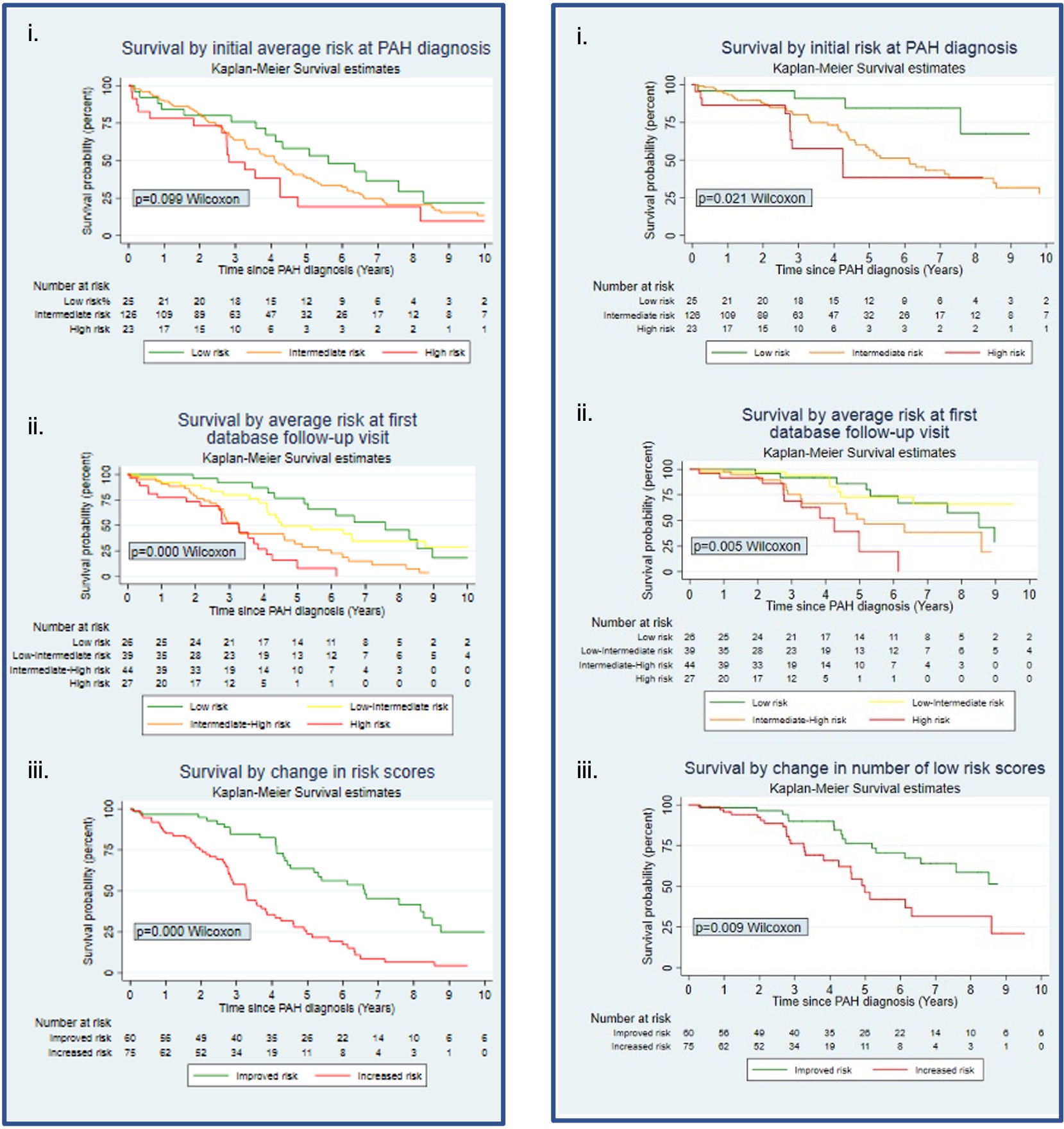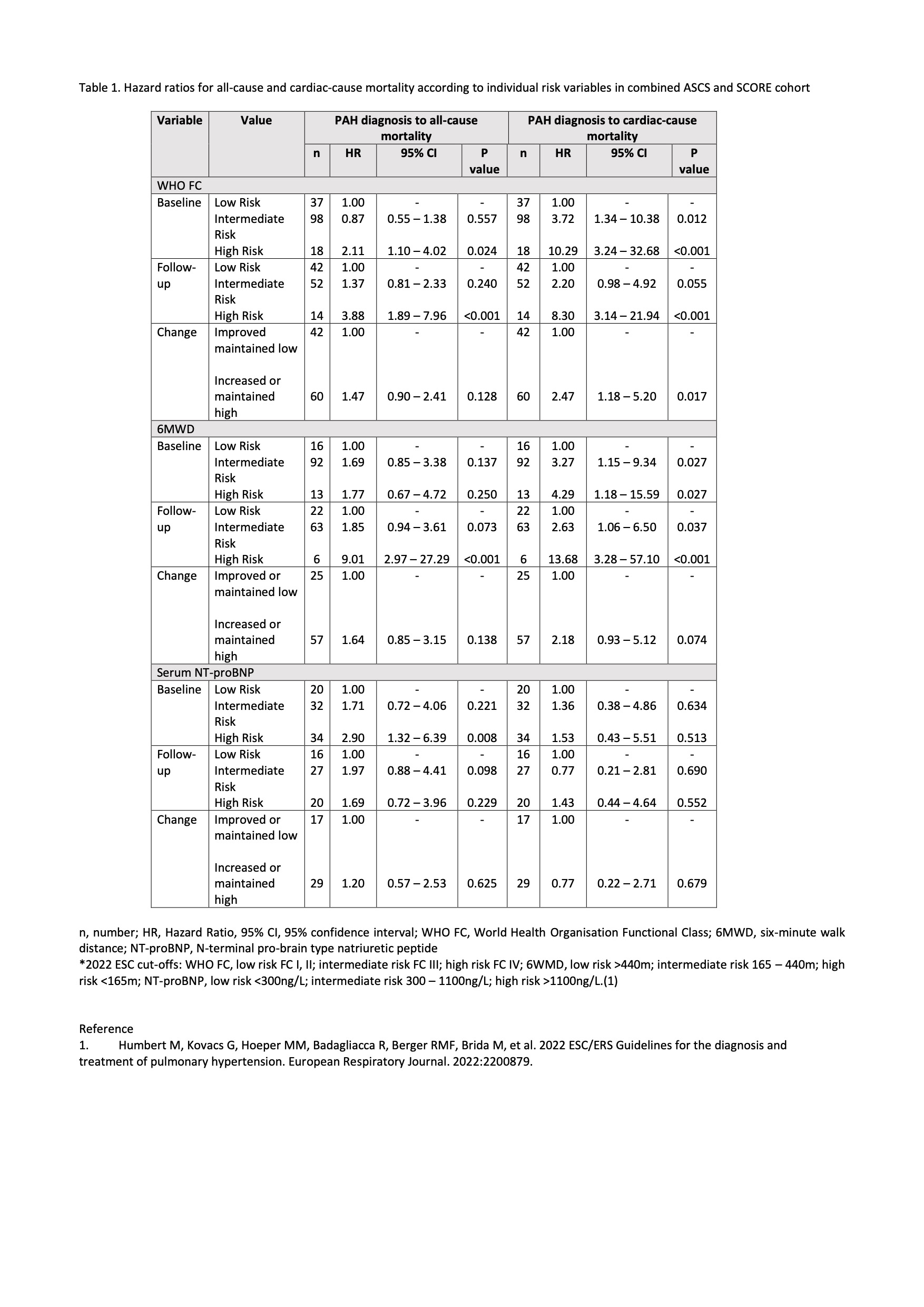Session Information
Date: Sunday, November 12, 2023
Title: (0609–0672) Systemic Sclerosis & Related Disorders – Clinical Poster I: Research
Session Type: Poster Session A
Session Time: 9:00AM-11:00AM
Background/Purpose: Pulmonary arterial hypertension (PAH) patients can be stratified as low, intermediate, or high risk of 1-year mortality based on clinical, biochemical and haemodynamic prognostic variables measured at diagnosis. In 2022, the European Society of Cardiology (ESC) and European Respiratory Society (ERS) updated their risk assessment method which is intended to guide therapeutic strategy over time.(1)
Methods: We evaluated incident systemic sclerosis-associated PAH (SSc-PAH) in a large combined cohort of Singaporean and Australian patients. We applied the 2022 ESC 3- and 4-strata risk assessment at baseline and first follow up (within 2 years), respectively. Kaplan-Meier survival analyses and Cox proportional hazards regression models were used to evaluate survival according to risk score.
Results: At baseline (n = 200), the majority of SSc-PAH (72.2%) were intermediate risk according to the 2022 ESC 3-strata risk assessment, based on ten variables. At follow-up, according to the 4-strata risk assessment (based on three variables: WHO functional class, serum N-terminal pro-brain type natriuretic peptide and six-minute walk distance), half (53.5%) of the cohort were classified as low or intermediate-low risk (Figure 2). The 2022 4-strata risk model at follow up demonstrated statistically significant differences in survival between risk groups with low risk having better survival, and a change in risk category from high or intermediate risk to low or lower risk was associated with an improvement in survival (Figure 1). All three individual parameters were significantly associated with mortality at baseline and/or follow up and included WHO functional class, serum N-terminal pro-brain type natriuretic peptide and six-minute walk distance (Table 1).
Conclusion: The 2022 ESC risk assessment strategy at baseline and follow up accurately predicts survival in SSc-PAH and is sensitive to change. Treatment decisions for SSc-PAH should include risk assessments, aiming to achieve low risk status according to the 2022 ESC guidelines as this is associated with improved outcome.
a.) All-cause mortality b.) PAH-related mortality
To cite this abstract in AMA style:
Brown Z, Hansen D, Stevens W, Ferdowsi N, ross l, Quinlivan A, Sahhar J, Ngian G, Apostolopoulos D, Walker J, Proudman S, Teng G, Low A, Morrisroe K, Nikpour M. Application of the 2022 European Society of Cardiology (ESC) Risk Assessment Model in Australian and Singaporean Systemic Sclerosis Patients with Newly Diagnosed Pulmonary Arterial Hypertension (PAH) [abstract]. Arthritis Rheumatol. 2023; 75 (suppl 9). https://acrabstracts.org/abstract/application-of-the-2022-european-society-of-cardiology-esc-risk-assessment-model-in-australian-and-singaporean-systemic-sclerosis-patients-with-newly-diagnosed-pulmonary-arterial-hypertension-pah/. Accessed .« Back to ACR Convergence 2023
ACR Meeting Abstracts - https://acrabstracts.org/abstract/application-of-the-2022-european-society-of-cardiology-esc-risk-assessment-model-in-australian-and-singaporean-systemic-sclerosis-patients-with-newly-diagnosed-pulmonary-arterial-hypertension-pah/


